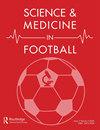The development of metrics for measuring the level of symmetry in team formation and ball movement flow, and their association with performance
IF 3.5
2区 医学
Q1 SPORT SCIENCES
引用次数: 2
Abstract
ABSTRACT Objective In the current study, we examined how football players’ usage of space and the teams’ ball movement flow throughout the match are associated with the quality of performance achieved in competition. Methods We constructed two novel metrics that aimed at measuring spatial symmetry and passing flow on a team-wide scope. Our aim was to clarify whether the way players position themselves throughout the match, and the passing patterns they produce, can explain team success. Results An analysis of all matches played in the 2018–2019 English Premier League season (N = 380) revealed a positive relationship between the teams’ spatiotemporal dynamics and team performance. Conclusion Based on the findings of our analysis, we discuss the strengths and limitations of the newly-developed metrics, and stress the need for additional studies examining their effectiveness.开发衡量球队阵型和球的移动流动的对称程度的指标,以及它们与表现的关系
【摘要】目的本研究考察了足球运动员在比赛中对空间的利用和球队的球移动流与比赛中取得的成绩质量之间的关系。方法我们构建了两个新的指标,旨在测量空间对称性和团队范围内的传递流。我们的目的是澄清球员在比赛中的位置,以及他们的传球模式,是否可以解释球队的成功。结果对2018-2019赛季英超联赛的所有比赛(N = 380)进行分析,发现球队的时空动态与球队的表现呈正相关。根据我们的分析结果,我们讨论了新开发的指标的优势和局限性,并强调需要进一步的研究来检验其有效性。
本文章由计算机程序翻译,如有差异,请以英文原文为准。
求助全文
约1分钟内获得全文
求助全文

 求助内容:
求助内容: 应助结果提醒方式:
应助结果提醒方式:


